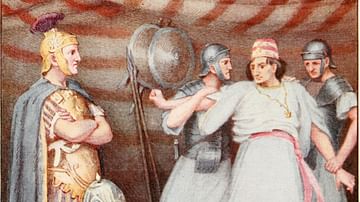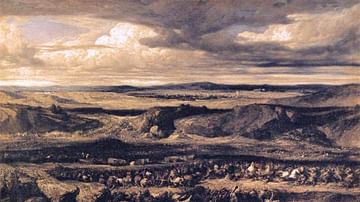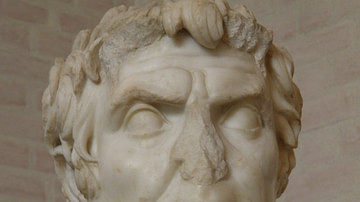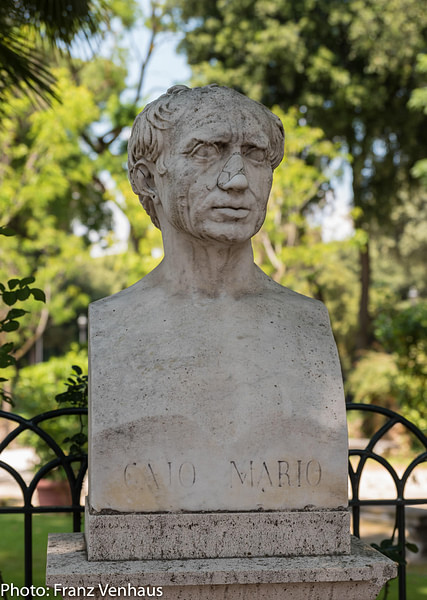
Gaius Marius (c. 157-86 BCE) was an accomplished military commander and politician who was acclaimed for saving Rome from the brink of collapse. Yet, unfortunately, his name has only survived in relative obscurity because his achievements were eclipsed by his ultimate fall. Despite his copious misdeeds, he should also be remembered for his stunning political and military successes and the indelible imprint that he left on Rome.
Early Life
Around 157 BCE, Marius was born to a plebeian family in an Italian settlement called Ceraete, near Arpinum. None of Marius' ancestors had ever been elected to a Roman political office, and he even claimed to have been raised in poverty, which meant that he was not seriously expected to become a person of importance.
At an early age, he entered Rome's legions and served with integrity. Then, by parlaying his relationships with influential Romans and expounding his honorable military service, he entered the political arena and climbed the political ladder, the cursus honorum. He was first elected to the military tribuneship, then tribune of the plebs in 119 BCE, praetor in 115 BCE, and he was subsequently assigned to govern the province of Farther Spain. Throughout his early political career, he proved that he was an adept and conscientious politician. In fact, Marius "won office after office, always so conducting himself in each of them as to be regarded worthy of a higher position than that which he was holding" (Sallust, The War with Jugurtha, 63.5).
Jugurthine War
After his governorship, Marius' political career temporarily went cold. In the interim, he married a patrician woman named Julia who later boasted a famous nephew, Julius Caesar, but Marius' intermission from public life was short-lived. In 109 BCE, Consul Quintus Caecilius Metellus was assigned to conclude the ongoing embarrassing conflict with the wily King Jugurtha of Numidia. Metellus, in turn, appointed Marius as his legate, which was an immense opportunity. The two traveled to Africa where they retrained the legions and attempted to engage Jugurtha, but Marius eventually concluded that Metellus' leadership was lacking and his strategy was too conservative.
So, Marius sailed to Rome where he implemented an effective campaign strategy of pandering to the lowest strata of society and thoroughly demonizing the aristocracy. His ploy worked, and he was resoundingly elected to the consulship of 107 BCE. Then he flexed his political muscle, thanklessly stripped Metellus of the Numidian command, and then had it transferred to himself.
Marius promptly recruited a much larger army, including volunteers from the poorest classes, which was contrary to Roman policy, and he altered the Numidian strategy. Then he set out to confront Jugurtha. Before long, Marius exacted stinging defeats upon the Jugurthine coalition, which left tens of thousands of Rome's foes slain and applied pressure on the Numidian's allies. By 105 BCE, one of Jugurtha's supposed friends agreed to capture and deliver the shrewd albeit beleaguered king to the Romans, and one of Marius' able officers, Sulla, oversaw Jugurtha's final surrender. Once Jugurtha was in Marius' custody, it signaled the end of the conflict, largely thanks to Marius' military operations and troop surge.
Cimbric War
There was little time to celebrate because a mighty northern barbarian tribe called the Cimbri emerged and imperiled the Republic. The Cimbri established a fearsome alliance with the Teutones, Ambrones, and others to challenge Rome. In response, in 105 BCE, Marius was unconstitutionally elected in absentia to his second consulship, and he was tasked with defending the Republic from the barbarian coalition. After celebrating a splendid Roman triumph, Marius traveled to the north with his army, trained them, and prepared for a campaign that might determine Rome's fate, but the barbarian alliance did not arrive as expected. For a couple years he waited, and each year, the Roman people unconstitutionally re-elected him as consul.
Finally, in 102 BCE, Marius' scouts reported the barbarians' advance in two, possibly three columns. Marius rushed to meet the tribesmen, but he sagaciously chose to engage the tribes individually and only after each had committed a strategic error. First, he defeated and methodically slaughtered the Ambrones, and subsequently the Teutones in the vicinity of Aquae Sextiae. Then, after being re-elected as consul for 101 BCE, Marius clashed with the Cimbri and systematically massacred them, ending the long-running conflict. During this single war, the Romans had killed an estimated 360,000 and apprehended another 150,000 who were promptly sold into slavery.
Military Reforms
During Marius' long tenure as a military commander, he proved to be an innovative general who instituted many reforms. Some of which remained in the legions for many years. While preparing to head to Africa to clash with Jugurtha, he enlisted Romans of all classes into his army, including the poor. This was contrary to Roman policy. However, it greatly expanded the Republic's recruitment pool and eventually became standard operating procedure in old Rome.
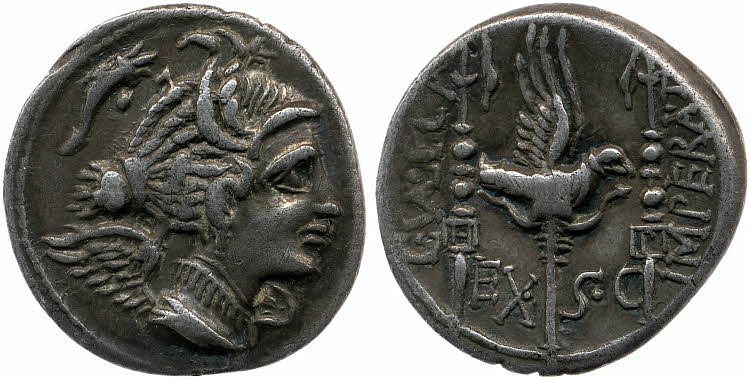
During the Cimbric War, he strove to rid his army of as many of its slow-moving pack animals as possible so that his troops would be quick and nimble. Thus, he required his legionaries to carry most of their supplies. While many soldiers complained about this added burden, this proved to be a commonsense and effective reform that became permanent. In a less than tactical move, Marius is also imputed with being the person who began the habit of only topping Roman legionary standards with a silver eagle. Originally, standards were adorned with the image of any one of multiple animals, but the eagle became a long-lasting mainstay of the legions thanks to Marius.
Marius' Sixth Consulship
Following the Cimbric War, Marius returned to Rome to a thankful populace who considered him one of Rome's founders and awarded him with his second magnificent triumph, and they even ritually offered libations to him. At this point, he sought the consulship once again but resorted to bribing voters, which ensured his election. Once he was in office in 100 BCE, he continued an ill-advised alliance with unscrupulous politicians, including Saturninus who ultimately revolted against the state. Marius begrudgingly responded, raised a force, and successfully neutralized Saturninus. However, many Romans turned against Marius because they realized that he had initially partnered with a murderous and seditious outlaw. As a result, his once vast influence waned to an extent.
Social War
Consequently, Marius quietly passed the next several years as an elder member of the Roman Senate, but by 91 BCE, disaster broke out near Rome as the Republic's Italian allies revolted, which sparked the calamitous Social War. The ruling Roman elites requested that Marius and other accomplished military men lead Rome's troops against the Italians, and Marius dutifully obeyed and competently commanded legions throughout 90 BCE. However, after one campaign season, he retired, publicly citing infirmities, but he was likely forced out of power by his senatorial enemies.
Struggle for the Mithridatic Command
As the Social War appeared to conclude, King Mithridates of Pontus emerged as Rome's most dire threat, and Marius greatly wished to lead Rome's legions against the pugnacious monarch. Yet, Sulla was ultimately given the Mithridatic command. After he departed to prepare his troops for the upcoming expedition, Marius instructed another unscrupulous tribune, Sulpicius, to introduce a measure to the Roman people to transfer the Mithridatic command to Marius, which he did. It passed, but instead of obeying the people's will, Sulla treacherously turned his troops on Rome itself in 88 BCE. After briefly attempting to repel Sulla's invading legionaries with hastily recruited rabble, Marius was forced to withdraw from the eternal city, and Sulla gained control of the Republic.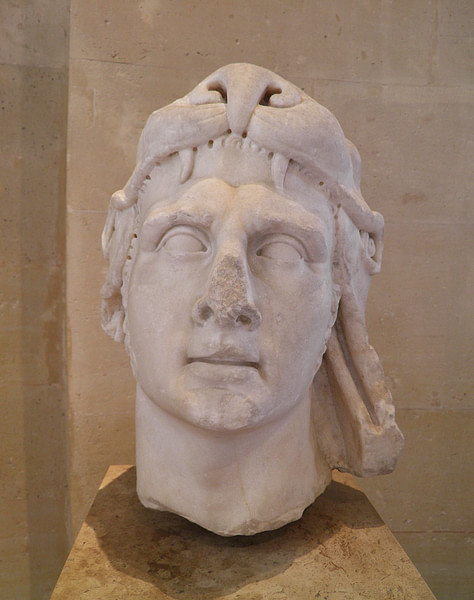
Before departing a second time to confront Mithridates, Sulla declared Marius an enemy of the state, placed a bounty on his head, and sentenced him to die. As a result, Marius lived the life of a desperate fugitive, and he endured many humiliations and close brushes with death. He ultimately fled to Africa, where he dodged his enemies and slowly assembled a small force for his eventual return to Rome. By 87 BCE, the Republic's two consuls, Cinna and Octavius, were in the midst of a violent spat, which provided Marius a chance to return. So, he sailed toward Italy with his newly levied troops, and he obediently offered to serve Consul Cinna.
Return to Rome
Consequently, Marius aided Cinna, and before long Cinna's co-consul was outmaneuvered and was forced to surrender, allowing Marius and Cinna to both re-enter Rome. However, they were not gracious victors. Marius had once assiduously safeguarded Rome, but he and his partner, Cinna, turned their attention toward settling their own personal vendettas. Then they slaughtered their domestic foes without trials. While the ancient historians, who were often hostile toward Marius, claimed that this was a widespread purge, "the most assiduous researchers can only attribute responsibility for seven of the fourteen known victims to [Marius]" (Carney, 67). Certainly, there may have been many more victims than this in the abhorrently immoral pogrom. However, it still paled in comparison to Sulla's eventual bloody proscriptions, which supposedly claimed the lives of thousands. Nevertheless, Marius' unrestrained vengeance utterly ruined his once largely commendable reputation.
Regardless of the killing spree, Marius and Cinna both declared their candidacy for the following year's consulship, and they were unsurprisingly elected. Marius achieved his prophesized seventh consulship, which was more than any other Roman had ever enjoyed up to that point, but his term was cut short. Mere days into it, his mind and body began to wither, and by mid-January, 86 BCE, he died, reportedly of pleurisy, at around the age of 70. Marius likely enjoyed an elegant funeral, but unfortunately, this was not the last time that Romans glimpsed him. When Sulla returned from defeating Mithridates, he initiated an unrestrained massacre, and he ordered his subordinates to exhume Marius' decaying remains, whereby they were abused and discarded as odious trash. This "was an ignominious end and the ultimate dishonour for the once-hero-turned-pariah of Rome" (Hyden, 253).
